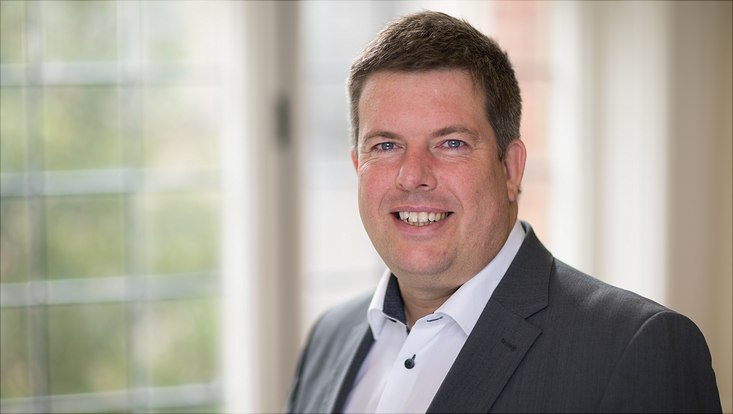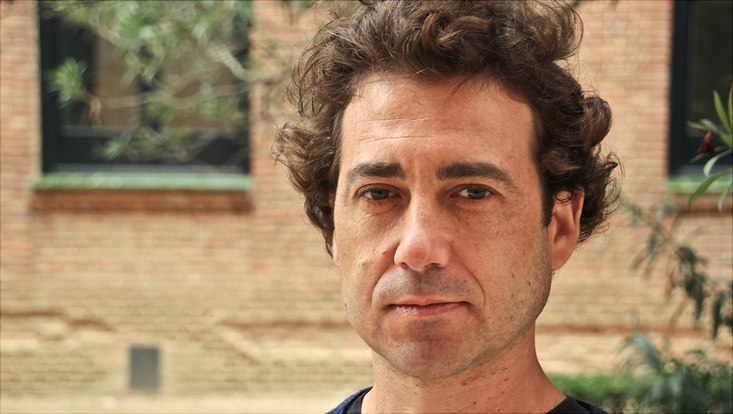„Welcome Aboard““Using interactions between light and matter to utilize in novel technologies”Prof. Dr. Dieter Jaksch will strengthen the Faculty of Mathematics, Informatics and Natural Sciences and the Cluster of Excellence “CUI: Advanced Imaging of Matter”
9 September 2021, by Jaksch/Red.

Photo: Fisher Studios
Every year, Universität Hamburg welcomes many new researchers. Here, we present part of a series to introduce them and their areas of research.
Prof. Dr. Dieter Jaksch will join the Faculty of Mathematics, Informatics and Natural Sciences in the winter semester 2021/22 from the University of Oxford as a professor for "Theory of many body quantum optical systems". He will work at the Institute of Laser Physics and conduct research in the Cluster of Excellence "CUI: Advanced Imaging of Matter".
My research area in 3 sentences:
I investigate interactions between light fields and quantum matter in non-equilibrium states. My aim is to find and understand new functional properties of these hybrid systems. Subsequently these can then be utilized in novel quantum technologies.
I explain what I do to family as. . .
Progress in digitization brings conventional classical information processing methods to their physical limits. I investigate if quantum mechanical superpositions of light and matter possess properties which allow the development of novel quantum technologies for information processing. A detailed understanding of those states and their properties is necessary to develop technologies like e.g. quantum computers or quantum simulators. I am convinced that quantum effects will in the future also increasingly be utilized to make conventional electronics components faster and more efficient. My work focuses on researching complex interactions between light and matter and aim to understand them well enough to enable experimentalists to control and exploit them in the laboratory.
I mainly use methods like:
I mainly use analytical and numerical mathematical methods for the theoretical description of many-body quantum systems.
I am so glad to be in Hamburg, the city and the University, because. . .
I got to know Hamburg as a cosmopolitan and dynamic city which is aware of the importance of fundamental research and a top quality scientific education. I am now looking forward to getting to know the city and its people better and make use of the broad range of facilities and events.
The University of Hamburg at its excellence cluster CUI focus strongly on researching non-equilibrium dynamics of many-body systems. A broad and interdisciplinary group of researchers has been formed in my area of research. This extends far beyond the traditional confines of physics and I am particularly looking forward to discuss science with colleagues from neighbouring fields of research.
My plans for working at Universität Hamburg include:
I am convinced that some quantum technologies will reach industrial relevance within the next decade. Moreover methods that were originally developed for solving quantum mechanical many-body problems are being repurposed to e.g. solve problems in logistics or aerodynamics.
In order to exploit the potential arising from this development in Hamburg we will need outstandingly well trained quantum scientists. I intend to strengthen teaching of courses that providing optimal training for these challenges and provide a deep and broad understanding of a range of different quantum technologies.
Students should definitely attend my courses because. . .
Quantum physics is a fascinating subject which allows us to describe physical phenomena that entirely disagree with our everyday experience. Only now, we are learning how to exploit these quantum effect in novel technologies. Thus, it is now the ideal point in time to engage deeply with quantum physics to then be able to actively contribute to the development of novel quantum technologies.
Reaching out to the world: I work with the following international and federal institutions and universities:
I have collaborative UK research projects with colleagues from the University of Strathclyde, the University of Durham, Imperial College and the University of Cambridge. Through a joint ERC project I have been collaborating with the University of Geneva, the Center for Computational Quantum Physics at the Flatiron Institute in New York, Collège de France and the Max Planck Institute in Hamburg for the past seven years. In addition, I have been a Visiting Research Professor am Centre for Quantum Technologies in Singapore since 2009.

